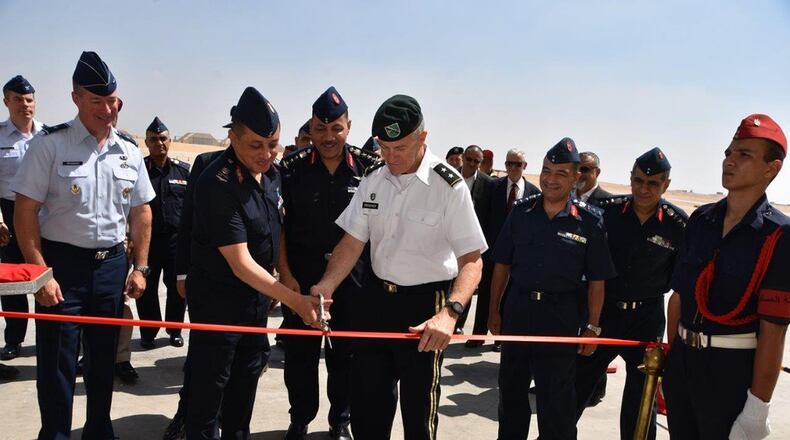The milestone was celebrated during a ribbon-cutting ceremony attended by senior Egyptian and American military officials, including Brig. Gen. Brian Bruckbauer in his first international trip as AFSAC director and director of International Affairs for the Air Force Materiel Command.
“Egypt is a very important partner to the United States and Department of Defense,” said Bruckbauer. “Having a confident, capable Egyptian Air Force that we can work with and possibly conduct operations with is important, and the work the team did resulting in the aircraft delivery and construction will promote stability in the region.”
The new F-16s will replace the Egyptian F-4 fleet and represents an increase in military capability.
More than 100 buildings vital to the operation and maintenance of the aircraft were constructed over 10 years, including hangars, training facilities, munition storage, living quarters, dining halls and offices.
Managing the construction project was AFSAC’s Construction Division.
“We served as the liaison and interface among the U.S. Army Corps of Engineers [which executed the construction contract], the U.S. Embassy, and other stakeholders, to ensure the Egyptian Air Force understood the [construction and aircraft delivery] timeline, schedule issues and costs,” said Dr. Carlos Braziel, chief of AFSAC’s Construction Division. “Our team members can be viewed as ‘engineer diplomats,’ ensuring the partner nation’s requirements are adequately de-conflicted with U.S. weapon system facility requirements and incorporated into the project’s overall design.”
Braziel added that his team’s long-term presence on partner nation’s air bases, like at Cairo West, provides an additional benefit to the U.S. government.
“Our team members normally spend on average one to two years providing oversight of the foreign partner’s project,” Braziel said. “The interaction between our members and partner nation counterparts at the construction sites helps the U.S. strengthen the security cooperation relationship with the partner nation.”
Braziel also said that some of the Egyptian bases that were constructed by other countries have infrastructure that is crumbling and is hard to fix and repair. But U.S. constructed facilities work and provide the capability that was intended for years to come.
AFSAC, which is part of the Air Force Life Cycle Management Center, worked closely with the AFLCMC F-16 Program Office to complete the project, including pricing and availability, execution of contracts and aircraft delivery schedule.
“We had to make sure our piece of the [foreign military sale] schedule integrated with the program office schedule so that when the aircraft were delivered, they have the facilities, and they have the runways to operate. If the aircraft was delivered without the right facilities in place to support, they would become ‘paperweights’,’” said Braziel.
“Lt. Gen. Charles Hooper, who is the director of the Defense Security Cooperation Agency, advocates for a total package approach to FMS,” Bruckbauer said. “Often countries get fixated on the system, like the F-16, and then forget about all of the other very important things needed to operate and sustain F-16s, like the facilities, maintenance, training, logistics and resupply to keep them operating. That total package approach is very important, and construction is such a key piece of that.”
The work AFSAC does is a key part of American foreign policy.
“We are in a very important business,” said Bruckbauer. “If you think of the possible political implications of not executing these programs correctly, upsetting an international partner could have significant political ramifications. Our professionals at AFSAC work tirelessly to ensure success.”
About the Author
